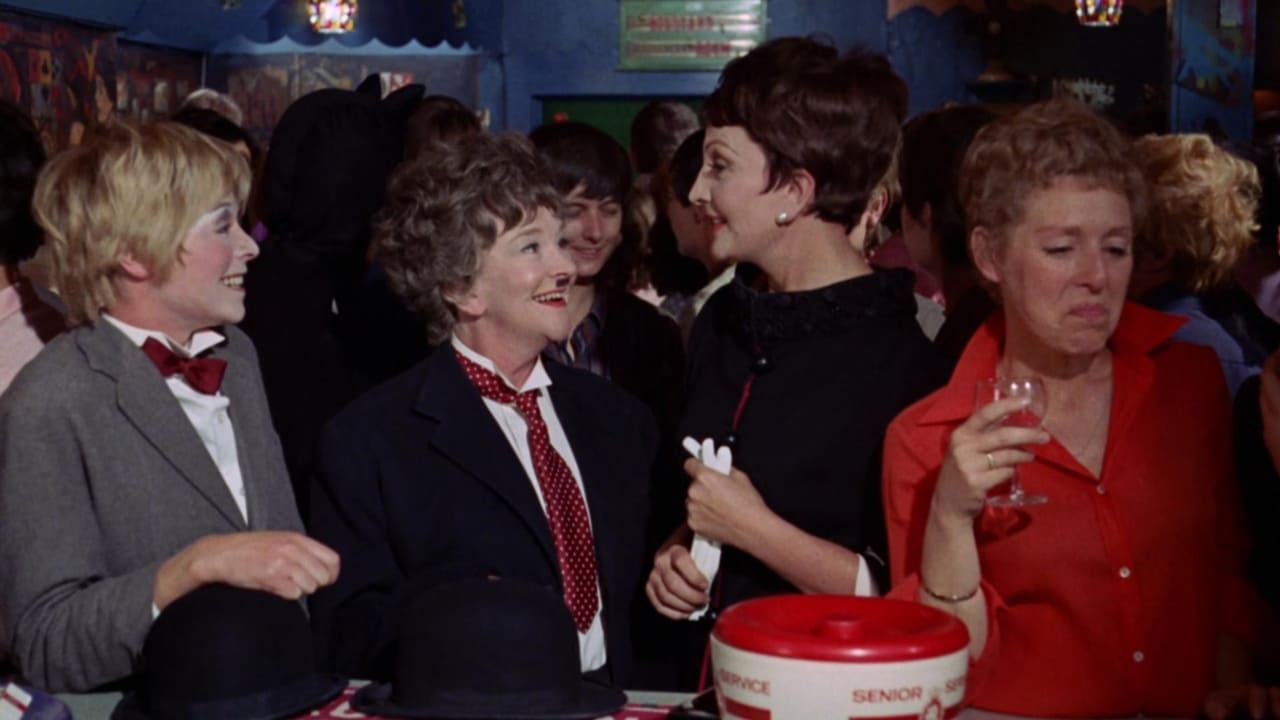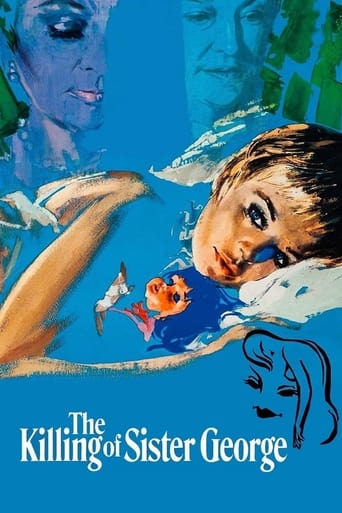

Overrated
... View MoreExcellent, a Must See
... View MoreIt's fun, it's light, [but] it has a hard time when its tries to get heavy.
... View MoreThe tone of this movie is interesting -- the stakes are both dramatic and high, but it's balanced with a lot of fun, tongue and cheek dialogue.
... View MoreSeeing Beryl Reid mouth silently a four-letter swear word when such things didn't happen in films and drunkenly canoodling with two young nuns in the back of a London cab is both quite outstanding and rather lovable.Miss Reid, who I only got to see in my childhood as a twee, granny-like innocent (the sort that she plays for real in a TV serial as Sister George, a homely district nurse), I found The Killing Of... both delicious and ever astounding in its frankness and of her rather warped relationship with the much younger Susannah York.Warped, not because of the age difference, nor of their same-sex partnership, but because June Buckridge (Reid) has a cruel streak that is borne out by her playing sadistic mind games with Alice "Childie" (York).Sister George, in the best tradition of TV soaps, is being killed off, to make way for an Australian replacement. Hence June's venomous outpourings and increasingly erratic behaviour.Equally interesting is the London of the late '60s, both in its landmarks but also its people and fashions, whether that's in how they live and/or how they dress and present themselves.Though real soaps cover such material freely and openly these days, 42 years ago, it must have been a very different kettle of fish. Lesbianism back in those days was not only considered immoral but also a mental aberration and had to be so hidden, in an attempt to prove to those 'righteous' souls that it did not exist. Therefore, it must have been a very brave undertaking as a film, though it originated as a play, written by Frank Marcus.Having now seen it again, I consider Robert Aldrich's ground-breaking film to be a bit of a classic and one, which, no doubt I'll want to see again in a few years time. It really is a piece of British cinematic history.
... View MoreI find that some films of the 1960's are very difficult to watch because of their character shattering plot developments. Along with "Who's Afraid of Virginia Woolf?", this is one of them. It happens to a very similar character here, who like Martha in "VW", has begun to isolate many people around her. June (Beryl Reid) is a lesbian soap opera actress in London who plays Sister George, a popular nurse on a serial. She lives with the "Baby Doll" like Katie (Susannah York), and emotionally abuses her when Katie, in her mind, acts up. On the set, June (called "Sister George" on and off screen) is more than a bit demanding, jealous of other actors whose popularity ratings are going up, and just a bit angry when it is insinuated by one of the crew members that her days are numbered. June gets rip-roaringly drunk, assaults two visiting nuns in a Taxi, and is reprimanded by Mercy Croft (Coral Browne) of the production staff. Her behavior gets more and more out of control until it all caves in on her and she is indeed prepared to be "killed off". Even that, June can't take with dignity, and makes funny faces at the truck drivers who "killed her off", which sets the cast and crew tittering. It's not apparent whether or not they love her or take pleasure in watching her downfall, but that's what happens here. Katie obviously has had enough, and Mercy, having visited June at a gay bar to tell her the news of her dismissal, sets her sights on Katie. From there it's just a matter of time before June ("Sister George") has her blowout, and ends up having a breakdown herself, much like Martha did in "Virginia Woolf".I think that you must be of an artistic, serious dramatic viewing mind, to watch "The Killing of Sister George", and familiar with having seen serious dramatic plays on stage. Every actor is outstanding, and the film is riveting to be sure, but it is deep, even if there is a lot of "black comedy" abound. Then, there is the lesbian issue. The films of the 60's have a bleak take on what living openly was like. Take a look at "Staircase" or "The Boys in the Band" to see the male version of this. These are not happy people. "Sister George" is only happy when she is the center of attention on the set, or when she is humiliating Katie, punishing her by forcing her to eat her cigar butt. Reid is simply amazing to watch with her boundless energy, York is enchanting, and you certainly won't confuse Coral Browne's Vera Charles ("Auntie Mame") with Mercy Croft. The film shows its theatrical routes which indicates why many plays did better on stage and felt like an acid trip when put on screen.
... View Morei found the going-ons behind the scenes more interesting and intriguing than the actual film itself. for starters this one film was considered by many to be a landmark film. Aldrich lost a lot of money from this film due to the sensory board giving it an x-rating and cutting away from the more explicit scenes between mercy and childie. Susannah york apparently was far from happy when told of the climatic love scene she was to have with coral Browne. according to one producer on set that day, york was a real bitch towards Browne simply because she did not want to do the scene. one long-time collaborator of Aldrich left in disgust over the subject matter. i personally feel that this film would have been more suited as a television mini-series than the silver screen though it holds up remarkably well after all these years.
... View MoreI never saw Reid on stage, but I saw a production by a local amateur groupwhich was much, much better than this film version. The director doesn'tunderstand the timing of the very British irony, wit, bitchiness and waspishness, and consequently the actresses flounder and the camera doesn't frame themright. Reid and York's flat should look sinister, with its mounds of dolls and grown woman in a babydoll nightie in the daytime, but these details are justTHERE. Imagine what a British noir director (Rober Hamer?) would have donewith them. York is lovely, but her voice is wrong, wrong, wrong. She shouldhave a whiny, slightly Cockney accent. She sounds like a debutantecomplaining that her icecream has gone runny. As for Reid, she is too cuddlyand lovable for the part. It would be fun to make this film again. xxxxx
... View More